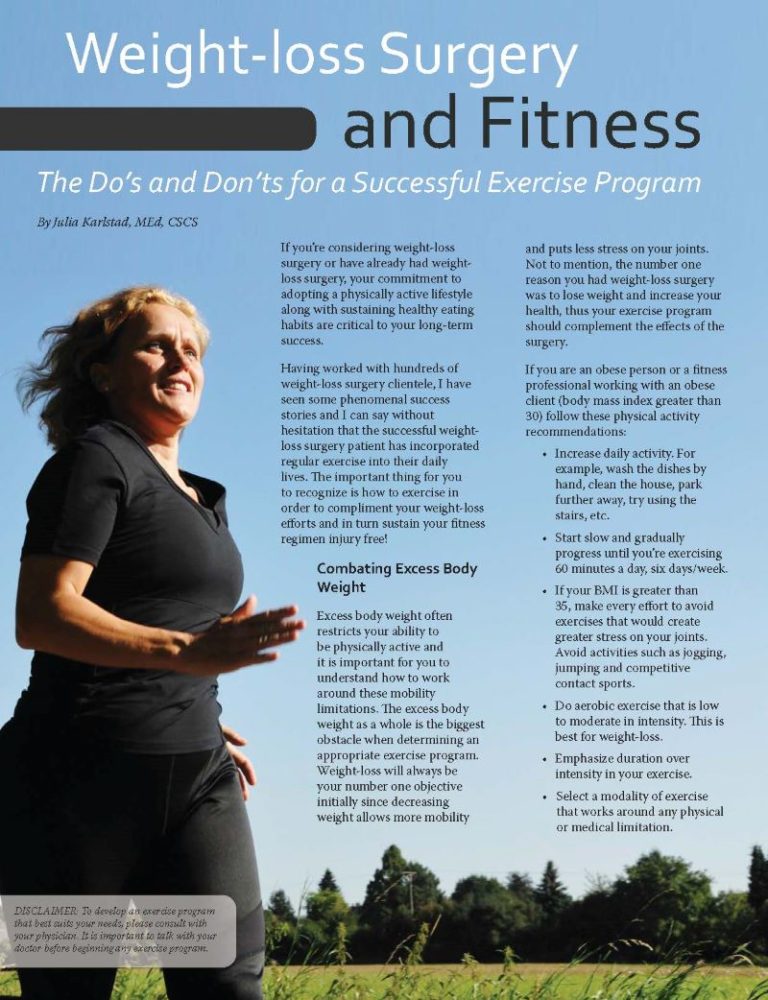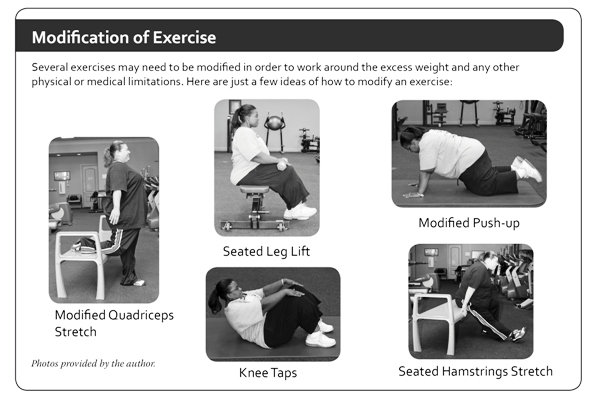Weight-loss Surgery and Fitness – The Do’s and Don’ts for a Successful Exercise Program


by Julia Karlstad, MEd, CSCS
Summer 2010
If you’re considering weight-loss surgery or have already had weight-loss surgery, your commitment to adopting a physically active lifestyle along with sustaining healthy eating habits are critical to your long-term success.
Having worked with hundreds of weight-loss surgery clientele, I have seen some phenomenal success stories and I can say without hesitation that the successful weight-loss surgery patient has incorporated regular exercise into their daily lives. The important thing for you to recognize is how to exercise in order to compliment your weight-loss efforts and in turn sustain your fitness regimen injury free!
Combating Excess Body Weight
Excess body weight often restricts your ability to be physically active and it is important for you to understand how to work around these mobility limitations. The excess body weight as a whole is the biggest obstacle when determining an appropriate exercise program. Weight-loss will always be your number one objective initially since decreasing weight allows more mobility and puts less stress on your joints. Not to mention, the number one reason you had weight-loss surgery was to lose weight and increase your health, thus your exercise program should complement the effects of the surgery.
If you are a person with obesity or a fitness professional working with a client with obesity (body mass index greater than 30) follow these physical activity recommendations:
- Increase daily activity. For example, wash the dishes by hand, clean the house, park further away, try using the stairs, etc.
- Start slow and gradually progress until you’re exercising 60 minutes a day, six days/week.
- If your BMI is greater than 35, make every effort to avoid exercises that would create greater stress on your joints. Avoid activities such as jogging, jumping and competitive contact sports.
- Do aerobic exercise that is low to moderate in intensity. This is best for weight-loss.
- Emphasize duration over intensity in your exercise.
- Select a modality of exercise that works around any physical or medical limitation.
- Strength training should consist of two to three sets of 12-15 repetitions. Use light to moderately heavy weights. The goal is to maintain your lean muscle through the weight-loss phase, not to bulk up.
- Focus on doing a total body strength training workout. Strength train anywhere from one to three times per week (a minimum of once per week), and be sure to leave at least 48 hours between strength training sessions.
- Always remember that joint pain is not healthy pain. If the exercise causes pain, modify the exercise to alleviate the pain.
- If you have major joint limitations in your lower extremities, try to perform most of your strength exercises from a seated position.
- Always change up your exercise routine (i.e., flexibility, cardio and strength training) every four to six weeks.
Exercise Guidelines for Each Stage of Weight-loss Surgery
The best thing a weight-loss surgery candidate can do to prepare themselves for both before and after surgery is to increase their level of fitness. The better cardiovascular condition before surgery, the fewer complications they’ll experience during and after surgery. The following guidelines should prove helpful:
Preoperative Stage
- Make weight-loss a primary goal of your exercise program. Excess fat can make the weight-loss surgery operation itself more challenging. In fact, most surgeons require that their patient lose a certain amount of weight before they will operate.
- Focus on cardiovascular exercise to improve heart health, decrease body weight and help lose body fat before surgery.
- Follow the exercise guidelines discussed above.
Post-operative Stage
If there are any postoperative complications, that is physical problems following the weight-loss surgery, schedule an appointment with your bariatric surgeon and follow the surgeon’s recommendations for an exercise program. For the first four weeks after surgery, focus on flexibility exercises, deep breathing and getting back into performing normal daily activities.
Gradually incorporate low-intensity aerobic exercise (i.e. walking, biking or swimming). If the surgery was laparoscopic, it is generally safe to start exercising up to your pain threshold two weeks after surgery, but it is best to consult with your surgeon before starting any exercise program. If the surgery was “open,” it may take a few more weeks to recover. Here are some tips for those that underwent “open” procedures:
- During the first six weeks after surgery, do not lift any more than 15 lbs; otherwise, exercise up to pain threshold.
- Avoid abdominal exercises for the first eight to 12 weeks (allow the incision to heal). This helps alleviate abdominal hernias near or around the incision.
- Significantly reduce caloric intake. During the first few weeks to months after surgery, patients should consume less than 500 calories a day (the surgeon will give specific instructions). This significant decrease in calories may initially cause some fatigue. Therefore, do not perform high-intensity exercise. As weight is lost and the level of fitness is improved, you will be able to take in a few more calories as well as exercise at higher levels of intensity. Follow the surgeon’s dietary recommendations.
Caloric Intake
The bariatric surgeon may increase the caloric intake to 1,200-1,400 calories six to 12 months after surgery, particularly if their patient has lost a large percentage of their excess weight. Follow the surgeon’s and/or dietitian’s recommendations on food intake. Regularly monitor and assess your exercise program to ensure continued compliance and continued weight-loss which ultimately leads to weight maintenance.
Conclusion
A lifelong exercise program is critical to a weight-loss surgery patient’s long-term success. Bariatric surgery is a valuable tool for rapid weight loss; however, in two to three years, if a physically active lifestyle has not been adopted, the weight returns.
Exercise is insurance for long-term weight-loss. If you can stick to this advice, you’ll be at a healthy weight and in good physical condition for years after your weight-loss surgery.

About the Author:
Julia Karlstad, MEd, CSCS, is the president of JKFITNESS, LLC. Julia has worked in the fitness industry and specifically the medical wellness community for several years. Previous to owning her own business, Julia personally developed and directed an exercise physiology program that consisted of two bariatric hospitals and three medically supervised weight-loss clinics.
For more information on Julia, please visit www.juliakarlstad.com or www.jk-fit.com.
by Yelena Kibasova Spring 2024 The fitness world is evolving, with new trends and innovations that promise…
Read Articleby Kendall Griffey, OAC Communications Manager Spring 2024 We have officially kicked off Your Weight Matters Regional…
Read Articleby Zack Lucks, NASM-CPT, EMT Winter 2024 Working out with a loved one is a great way…
Read Article







